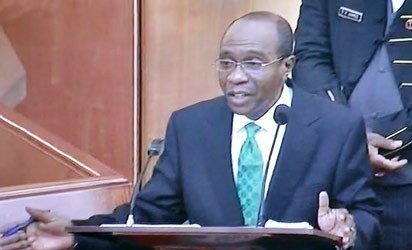
By Babajide Komolafe The National Collateral Registry (NCR) office has outlined measures to increase lending by financial institutions to Medium, Small, and Micro Enterprises (MSMEs) to over N2 trillion in 2019. Mr Godwin Emefiele answering questions during his screening by the Senate for Central Bank Governorship in Abuja on Wednesday These include 50 percent increase in utilisation of the NCR by financial institutions, and liaising with supervisory departments of the Central Bank of Nigeria (CBN) to ensure compliance with the Secured Transactions and Movable Assets Act, 2017. Nigeria has about 32 millions MSMEs which employ millions of Nigerians as well as contribute to the nation’s economic growth. But many of them find it difficult to survive or prosper due to lack of access to credit facilities from financial institutions. Financial institutions are mostly unwilling to lend to MSMEs because they don’t have properties like land and buildings which can be used as collateral for loans. ALSO READ: NDIC returns N7bn surplus to treasury This is confirmed by a survey conducted by a World Bank/Central bank of Nigeria team which shows that only 31 percent of MSMEs in Nigeria currently have a loan with a bank or a microfinance institution, and that personal savings and business income are the most important sources of capital for financing businesses. At the same time, 82 percent of financial institutions surveyed said that inadequate collateral is the most common challenge in granting loans. Minister of Industry, Trade and Investment, Okechukwu Enelamah Rationale for the NCR To address this challenge and deliver on its mandate on sustainable economic inclusive growth and financial inclusion, the Central Bank of Nigeria (CBN) in collaboration with the International Finance Corporation (IFC) established the National Collateral Registry (NCR). The establishment of the NCR follows the success recorded by similar initiatives around the world. According to the IFC, “Collateral registries are breaking down barriers to lending, especially for women and younger entrepreneurs who often do not have credit histories or banking relationships. Colombia’s collateral registry was launched in March 2014. Since then, it has received over 1.3 million registrations. “Also, about one-fourth of these registrations represent credit to micro, small, and medium enterprises—and there is clear potential to increase the numbers. More than 100 financial institutions, including some of the largest banks in the country, are already participating in the registry as lenders.” The IC noted further: “Mexico has implemented an electronic movable-collateral registry—with 97 percent of the registrations supporting loans to small and medium enterprises. In May 2015, a new secured-transactions system came into effect in Costa Rica. In the year that followed, there were about 9,500 new registrations. More than 4,500 small and medium enterprises received loans secured by movable assets. The World Bank also noted that in Ghana, the collateral registry has facilitated $1.3 billion in financing for the small-scale business sector since it was established in 2010, and $12 billion in total financing for the business sector using movable assets as collateral. Umaru Dikko Radda NCR Mandate Launched in May 2016, the NCR is a financial infrastructure that seeks to deepen credit delivery to Micro Small and Medium Enterprises (MSMEs) through enhanced acceptability of movable assets (equipment, machinery, vehicles, tricycle, crops, livestock, account receivables, inventories, jewelries etc.) as collateral for loans by financial institutions. It is a noticed based Registry where security interests in moveable assets are registered after being used as collateral to obtain facilities from financial institutions. It allows lenders to assess their priority interest in potential claims against particular collateral. The objectives of the Secured Transactions & National Collateral Registry (ST/NCR) is to enhance financial inclusion in Nigeria, stimulate responsible lending to MSMEs, facilitate access to credit secured with movable assets, perfect security interests in movable assets, facilitate realisation of security interests in movable assets, and to establish a Collateral registry and provide for its operations. The key deliverable of the Registry is to promote the acceptance of movable asset as collaterals for loans and contribute to economic growth and development of the country.
Read more at: https://www.vanguardngr.com/2019/02/lending-to-msmes-under-national-collateral-registry-to-hit-n2trn/
Source of shared Link

Warning! This user is on my black list, likely as a known plagiarist, spammer or ID thief. Please be cautious with this post!
If you believe this is an error, please chat with us in the #cheetah-appeals channel in our discord.
Downvoting a post can decrease pending rewards and make it less visible. Common reasons:
Submit